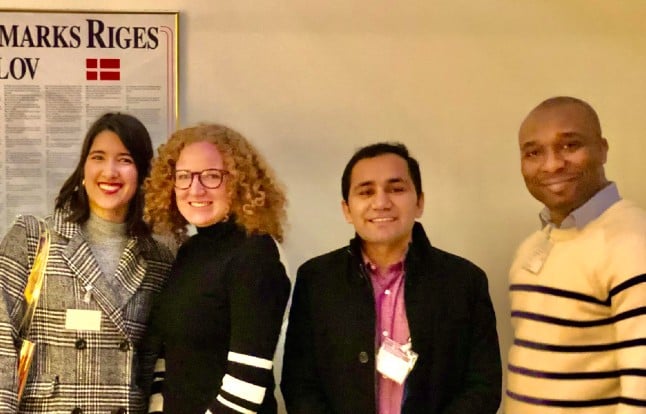WORK PERMITS
OPINION: It would be unfair to deport foreign workers hit by coronavirus lockdown
Naqeeb Khan from the Danish Green Card Association argues it would be unfair to deny visa extensions or permanent residency to migrant workers because of income lost due to coronavirus.
Published: 20 March 2020 14:59 CET

Naqeeb Khan (second from right). Photo: Naqeeb Khan
The coronavirus crisis has caused a huge human and economic loss. But it has also united us as human beings, because we are all in this together.
One of the groups in Denmark that the coronavirus crisis will affect the most is immigrants — especially those on temporary visas, green card holders, and those applying for Permanent Residency (PR) permits.
These immigrants need to demonstrate a minimum annual income before they can extend their visas to stay in Denmark or apply for PR, something which in the current crisis it will be almost impossible for many of them to do.
We at the Danish Green Card Association believe that the Danish government should waive the equivalent of three months of annual income or working hours.
This will save foreign workers from being unfairly forced to leave Denmark simply because of income lost to the coronavirus shutdown.
The situation
Immigrants in Denmark e.g. green card holders are required to show an annual income of DKK 317,681 (Styrelsen for International Rekruttering og Integration SIRI calculation) to extend their visa. Similarly, those who have to apply for Permanent Residency permit are required to show an annual income of DKK 292,256 (SIRI Calculation 2020 level). PR applicants should also be able to demonstrate continuous work over at least 120 hours per month over the last four years
Due to coronavirus, thousands of employees have now been fired, many have been told to stay home or asked to work less hours than usual. The current situation might last for months. This will surely impact the annual income of these immigrant, which will put them on risk of losing their visas or green cards or of having their permanent residency applications rejected.
One member, who has been working in the tourism industry for five years was told on Monday March 16 to stay home until further notice from. It will be hard for him to find another job in the current crisis. His visa extension is due in December this year, and he will be expected to show 12 months’ income. It would be unfair to ask him to demonstrated the usual annual income.
Another member, who has been working at an ice cream factory for the last four years lost his job on Monday March 16, because of the coronavirus shutdown. He had applied for permanent residency six months ago and was expecting a decision on the application within the next 3 months. Under the current rules, his PR application will be rejected simply because he will not fulfil the current work requirements.
Applicants for permanent residency may have fulfilled all work and language requirement and passed the citizenship exam. But they now face rejection due to failing the the income requirement through no fault of their own.
Proposals:
Income Requirement for Visa Extension:
The current rules states that to receive an extension to a visa (green card), the applicant must show an annual income of DKK 317,681 (SIRI calculation). In the current crisis, it will almost impossible for many to meet this requirement.
We recommend that the Danish government waive at least 3 months’ income, reducing the required annual income to DKK 238,269.
Income Requirement for Permanent Residency applicants:
The current rules state that those applying for a permanent residency permit should have had an annual income of DKK 292,256 over the two years leading up to the application.
We recommend that the Danish government waive three months’ income from the second years, reducing the required annual income DKK 219,192
Work Requirement for Permanent Residency applicants: The current rules states before applying for permanent residency, applicants should have worked for 120 hours per month over the preceding four years (the requirement is for three and half years' work under the eight year rules).
We recommend that applicants should be exempted from the 120 hours a month requirement for three months, starting from March 2020.
Continuous Work Requirement for Permanent Residency applicants
The current rules also state that if someone has submitted a PR application that they should still be working even after they have submitted the application. In the current situation, many applicants have suddenly lost their jobs, meaning they risk having their application rejected.
We recommend that the continuous work requirement be waived for those who have lost their jobs during the three month coronavirus shutdown.
Url copied to clipboard!


 Please whitelist us to continue reading.
Please whitelist us to continue reading.
Member comments